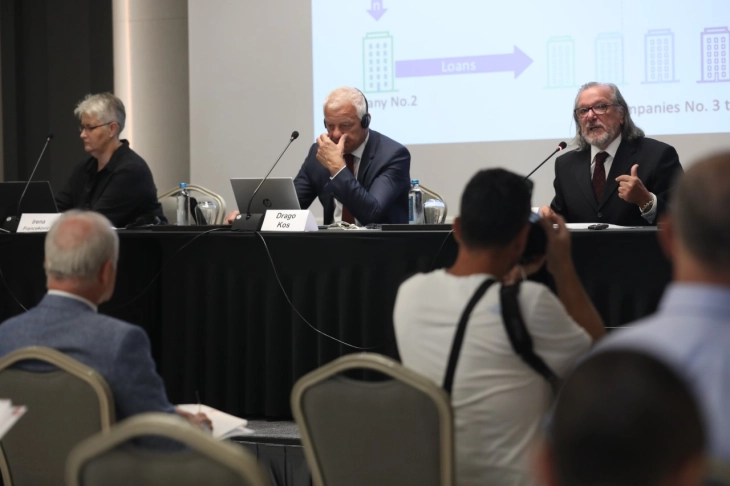Allegations of illegal banking schemes, NB and MBA deny illegal operations

Skopje, 23 August 2022 (MIA) – A presentation of a report from an investigation into the bankruptcy of Eurostandard Bank, prepared at a request of the bank’s largest shareholder Trifun Kostovski, said Monday that an illegal banking scheme has been operating in North Macedonia since 2004, and the National Bank has refused to recognize and prevent the existence of the scheme. In separate reaction statements, the National Bank (NB) and the Macedonian Banking Association (MBA) denied the allegations, urging not to harm public interest and adding that the Macedonian banking sector has been and remains the healthiest fabric of the country’s economy.
Drago Kos, international anti-corruption and organized crime expert who led the team working on the report, told Monday’s joint press conference with Kostovski that since 2004, there has been a well-established scheme in the Republic of North Macedonia through which several commercial banks have systematically violated the applicable regulations in banking, in order to be able to carry out illegal lending in addition to legal lending, mostly to entities unable to access bank loans.
The scheme, according to the report, worked in such a way that a certain bank has identified companies willing to give up their business accounts, to whom the bank then paid certain amounts based on fictitious lending agreements, and then the companies formally loaned those amounts to other companies, exclusively by choice and as organized by the bank. In a similar way, these funds were then returned to the bank. In that way, the bank has realized profit from artificially increased credit placements, paid commissions, interest rates, penalty interest and other costs, while the companies that acted as transmitters of illegally acquired money, i.e. converting credits into loans, usually suffered major loss due to the exceptional scale of the scheme which didn’t allow the possibility of exercising control.
According to Kos, in the period between 2004 and 2011, seven banks, 45 other companies and one natural person were involved in the scheme. In the same period, at least 103 forged signatures on transfer orders, five forged signatures on credit agreements and 32 forged signatures on loan agreements were proven, and 40 fictitious credit agreements and 81 fictitious loan agreements have been prepared and signed. In addition, for approximately 54 transactions between companies that were involved in the scheme, no loan agreements were concluded at all, which points to the fact that Komercijalna Banka, due to the scale of the scheme and the number of banks and companies involved in it, finally lost all control over it. Through this scheme, which operated from 2004 to 2011, only through two companies, Komercijalna Banka earned EUR 5,573,602 in illegally acquired profits, while these two companies suffered damages in the amount of EUR 21,601,991.
“None of the companies involved in this scheme were fully aware of this, as it involved many banks and companies whose representatives, despite large cash transactions, often didn’t even know each other. None of these companies could keep records of all payments, because they simply didn’t know about them, particularly if the money was transferred through other companies and through commercial banks other than theirs. Only the banks, at least in the initial stages, could monitor the flow of this lending and loaning process, and as the scheme developed, even they began to lose control over who paid whom and who owed whom,” said the report.
According to the report, Eurostandard Bank became involved in the illegal lending scheme in 2011 at the earliest, which Kostovski claims has been done without his or the shareholders’ knowledge. “With my statement, I only want to reveal that EUR 3 million, a specially given deposit from Eurostandard Bank, which cannot be repurposed or used for other needs, were illegally used, without the consent of the supervisory boards of the two banks. In an agreement, known only to the management boards of the two banks, these funds have disappeared,” Kostovski said.
According to him, Eurostandard Bank has been driven into bankruptcy with intent, and the National Bank hadn’t used all the tools at its disposal. The National Bank, he added, only used regular measures and bankruptcy as tools, whereas extraordinary measures were partially used, although it was within its competence to revoke the licenses of the members of the Management and Supervisory Boards and directors of departments.
In a reaction statement to the press conference, the Council of the National Bank qualified the presented information and opinions as irrelevant and inaccurate. It added that the National Bank is a professional and independent institution, which applies the highest international standards and practices in decision-making, as is also confirmed in evaluation reports by international financial organizations and credit agencies.
“With regard to the privately ordered report by the former shareholder and longstanding chairman of the Supervisory Board of Eurostandard Bank, over which bankruptcy proceedings were opened due to insolvency in August 2020, we express serious concern about the ease with which different individuals present inaccurate information related to with the banking system and the National Bank. Such irresponsible behavior, motivated by personal interests and private urges, can bring unrest and cause unnecessary and groundless damage to financial institutions in the country, and thus to the economic entities and citizens. For the National Bank, the information and opinions, particularly regarding the situation in the banking and financial system of our country and the way of work of the National Bank, expressed by the person who ordered this report, as well as the persons who were hired by him to prepare and promote it in the public, are irrelevant and inaccurate,” reads the Council of the National Bank’s statement.
In relation to the operation of Eurostandard Bank, the statement adds, the National Bank in performing its competence as a supervisory authority found significant weaknesses and failures.
“Starting from 2013 until 2020, the National Bank issued a total of 30 legal acts to Eurostandard Bank AD Skopje in connection with the findings, which contained around 120 different measures to improve the bank's situation. The National Bank will not allow any bank to continue operating without meeting the minimum legal requirements, thereby protecting the stability of the entire banking and financial system. Hence, in conditions of non-compliance with the given measures, and taking into account the capital adequacy rate and the situation in the Bank, the National Bank, in accordance with the Law on Banks, revoked the bank's license to operate,” reads the statement.
Also, according to the Macedonian Banking Association (MBA), the allegations about the banking sector presented at the press conference are completely unfounded. “No one has the right to present unsubstantiated allegations and claims about an entire banking sector of a country based on some private investigations. The Macedonian banking sector has been and remains the healthiest fabric of our economy, and no one has the right to make attempts to undermine its reputation and disparage it,” the MBA said.
The Association demanded that all misinformation and insinuation presented to the public about the banking sector and individual banks be rejected because, it added, for the purposes of achieving some other interests and someone’s personal battles, consciously or unconsciously, an attempt is made to threaten something that is of public interest of every citizen, every company, every institution in the country.
“The collapse of a bank due to problems and irregularities happening in the bank itself, about which the entire public was informed, must not be and cannot be cast as accusation against an entire sector,” said the MBA.
On August 12, 2020, the National Bank announced that it closed Eurostandard Bank, due to non-fulfillment of minimum legal conditions for operation, after which a proposal was submitted to the competent court to open bankruptcy proceedings. Governor Anita Angelovska-Bezhoska said at the time that the key issues of the bank were a reflection of the weaknesses of the past period, and not of the current situation. One of the major weaknesses in the bank’s operations has been taking over greater credit risk or lower security of loans granted, which results in credit loss. Loans accounted for 50 percent of the bank’s total assets, i.e. Mden 3.6 billion.







